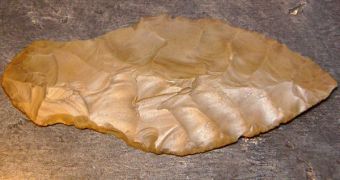New archaeological finds cast a new light on the life of early humans, living as far back as 72,000 years ago. It would appear that even in those remote times, toolmakers knew the fact that treating their tools thermally, as in with fire, provided a new set of traits, that could not be obtained naturally. The finds were made on the South African coast, at a Middle Stone Age site known as Pinnacle Point, the BBC News informs. Historians say that the new tool production method may tie together using fire for cooking and using tit for ceramics.
While the former became common in early human settlements some 800,000 years ago, the latter only appeared some 10,000 years ago, as control of fire became advanced enough to allow for pottery to be created. The new technique, of augmenting stone tools, may be an intermediary step in this process, historians and archaeologists point out.
“We found that as early as 165,000 years ago, but definitely 72,000 years ago, people are doing more than just using fires for cooking, heat, light or protection. I think heating stones is the dawn of human engineering. One of the things that make us uniquely human is that we can take the things in our landscape and adapt them. We can engineer them to fit our needs,” says Arizona State University (ASU) expert Kyle Brown, who was the lead researcher on the new study.
How exactly our ancestors managed to realize that fire can be used for extracting iron and copper from their respective ores, a find that is first documented to have occurred about 10 millennia ago, has been a mystery to archeology. The new discovery seems to suggest that the habit developed gradually, as more complex techniques of using fire, and also methods of controlling it better, were discovered. “These early modern humans seem to have been able to make a big mental jump,” Brown says.
“What we had spent six years looking for had always been right under our noses. Taking that step of putting the stone in the fire and pulling it out (...) I could imagine what the first people must have thought when they did that and realized that what they just did was going to change their lives,” the archaeologist concludes.

 14 DAY TRIAL //
14 DAY TRIAL //